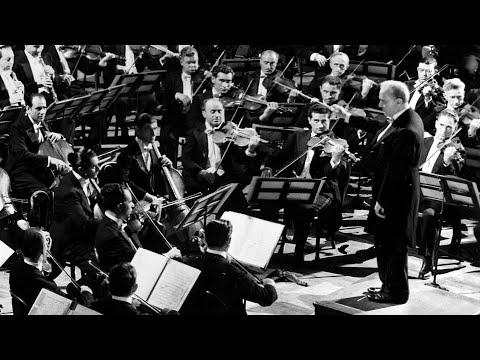When I was in graduate school, I took an advanced musicianship class, which mainly demonstrated that I was not an advanced musician. One of the components was ear training and dictation. Our task was usually to notate a series of dense chords and tricky modulations the teacher played from the piano.
One class, she played a sequence that was so beautiful, with such a subtle and complex modulation, that no one transcribed the whole thing–not even the experienced transcribers with perfect pitch. Before she reached the end of the passage, everyone had put down their pencils just to listen. One student asked, “Who was that?”
“Bruckner.” (Specifically, a section from the slow movement of the Symphony No. 8.)
The name hit me at the perfect moment in my life. That semester, I was working on getting rid of whatever snobbishness lingered in myself, which was a lot. I went to the music library regularly, pulling LPs of music I had previously dismissed—mainly because I didn’t really know it, and there’s nothing easier for a snob to dismiss than that which they don’t know—off the shelves and listening all the way through. I was challenging myself to hear what I had been ignoring. One composer at the top of that list was, now, Bruckner.
I found the classic recording of his Symphony No. 9, with Bruno Walter leading the Columbia Symphony Orchestra, and dropped the needle. Immediately, I was hooked by the mysterious opening, which is nothing more than a D in octaves. The ominousness of this one note in the strings was unlike anything I had ever heard before, even in Mahler, Stravinsky, or Shostakovich. It was just a D, one note that was full of portents of the music that was to come.
What music it was. A series of massive, arched, climactic moments that seemed self-contained, until another episode glided into view. Some of the music was serene; more of it was dark. The Symphony was ultra-dramatic, but without the narrative through-line familiar to me from the romantic era. And this work was certainly romantic, the music wrestling with internal conflicts and external fates.
The contrasts between beauty and gentleness and frenzy, the malevolent pounding of the scherzo—crazed even beyond what I knew in Shostakovich or “The Rite of Spring”—were on a level and of a quality outside of classical music. The only stuff I knew that approached this extremity of expression was thrash metal, Cecil Taylor, or some moments of King Crimson live. Then the Adagio, with the same episodic form and the feeling of passing through tableaux, some grim and others exalted, to reach, finally, a point of peace. It was gripping. Also, so damn weird.
Still, Bruckner’s Symphony No. 9 was easy to hear and follow, and it was new in an exciting way. Not just new in what was my experience of 19th century music up to that time, where composers like Wagner, Berwald, or Chopin tinkered with the conventions of the era. Bruckner pioneered a way of organizing musical form that didn’t belong to the 19th century. There was no thematic development, no sonata-allegro structure that placed ideas against each other so as to effect mutual transformation. It wasn’t a story or a psychodrama. Bruckner’s was music pinned to a fixed point in time and emotional space. It slowly turned around that point: It was a polygon that showed one face, then another, and finally, after revealing all it had, stopped and vanished. Hearing this in the late 20th century meant using ears informed by Debussy, Feldman, and Glass, “In A Silent Way” and “Bitches Brew.” My ears told me this was New Music from a time when it could not possibly exist. I felt like an archeologist uncovering an ancient buried city and discovering a rocket ship.
I was smitten. I was also stunned to discover that, man, people do hate themselves some Bruckner.
The latest from VAN, delivered straight to your inbox
This hatred started in the 19th century, when Bruckner’s symphonies were genuinely new. The important critic Eduard Hanslick wrote that the Symphony No. 8 was “Interminable, disorganised, and violent… stretches out into a hideous length … It is not impossible the future belongs to this nightmarish style, a future we therefore do not envy.”
The main critical change was formlessness, which makes sense from the 19th century, Germanic perspective of Hanslick, as well as other critics and composers, whose structural understanding existed along a pathway paved by Beethoven through Brahms (who himself detested Bruckner’s music). One critic complained that Bruckner didn’t use any clear musical structure, but “a series of tonal shapes willfully strung together.” Julian Horton, in his book Bruckner’s Symphonies: Analysis, Reception and Cultural Politics, points out that “In Britain… Bruckner was, until fairly recently, widely regarded as a defective continental curiosity.” In other words, the composer eschewed what Horton describes as “the Brahmsian concern for classical formal archetypes.”

That was the point. One of the curiosities of the reception to Bruckner was how well some critics explained exactly what the composer does–while rejecting it out of hand. The critic Charles Berry complained about the duration of Symphony No. 7, “a fault substantially aggravated by a lack of proportionate interest—in an exaggerated and spasmodic manner only allowable when the composer follows the changing and contested sentiment of a poetic text.” Berry added that Bruckner used an “extraordinary mixture of scholasticism with the freedom of the Wagnerian school.”
One man’s trash is another man’s treasure. Bruckner’s counterpoint is impeccable (he taught it), and his modulations are off the skill charts. But mostly, the freedom’s the thing: Bruckner’s freedom from the received models of composition; the feeling that his symphonies, especially the Ninth, have the freedom he enjoyed at the organ, where he was renowned for his playing and improvising. The Symphony No. 9 sounds like an extended improvisation, with discrete ideas discovered and arrayed in time. Despite Cage and Stockhausen and Xenakis and Meredith Monk and so many others, this model still seems to go against the grain.
Bruckner is often played on orchestra subscription concerts, but still disdained in the classical world. In The Independent, Jessica Duchen wrote an article with a title that says it all: “Anton Bruckner makes me lose the will to live.” Emily Hogstad wrote a multipart essay at violinist.com called, “I Hate Bruckner,” and her complaints capture a lot of the animus against the music: “Bruckner is the one who apparently can’t say anything worthwhile without a hundred-piece brass section blowing away for over an hour.” She also describes him personally as “creepy,” a not-infrequent and reflexive condemnation of what little we know about the inner life and sexual desires of a man who never acted on them. The composer is such an automatic subject for snarky jokes that even this publication answered a social-media question about Bruckner this way:
The experience of feeling sound vibrations humming in your body when Bruckner is played at full volume is one classical music needs to produce more often. But this is not just a call for more Bruckner. Rather, I think the haters should try to hear exactly what it is about his music they are hating. For many, it might actually be something they value, but they are letting hidebound snobbishness get in the way.
Bruckner is new music. Of any composer, the one with the most structural similarities to Bruckner is Philip Glass. Repeated blocks of expressive sound laid one after another, alternating with different repeated blocks, forming musical signposts within extended durations–I could be describing Bruckner’s Symphony No. 8, but also “Einstein on the Beach” or “Music in 12 Parts.” It’s no surprise that Glass is fond of Bruckner.
It took a while, but now we love Glass. Glass had the advantage that he came from the outside, that classical music rejected him. That made him cool. Bruckner was also an authentic, outsider artist, but the circumstances of his life make this harder to see. He studied and taught in the formal sense, he played the organ in a cathedral, he wrote symphonies. He was part of the establishment—at least in the sense that those were his peers and colleagues—and we are in an age that wrestles with the establishment.
There are features of his life that do make people uneasy. He was 76 when he died, apparently a virgin. He thought about young women a lot. He had a naïveté that is difficult for us to comprehend outside of cartoonish stories like “Forrest Gump.”

And then there was his relationship to God. Bruckner was a devout Catholic. Western mainstream culture is highly secular, and in the United States, Christianity can take on a tribal tone. Some secularists worry that devout Christians are striving for a “Handmaid’s Tale”-like authoritarian society; some Christians apparently have decided that since they talk about Jesus Christ a lot, that they are free to do whatever—they’ve accepted grace, so their acts have no consequences. (It’s all very convenient.) Bruckner, on the other hand, was truly devout, and I hear that in his music. The grand shape and scope of his symphonies is not about him, but about the immense power and unknowability of God. Bruckner is like the blind scientists trying to describe the elephant, except there’s only one of him and he knows he can never lay his hands on the whole thing. But he doesn’t need to. Bruckner accepts that God, and God’s universe, is beyond human language and comprehension. His symphonies, especially the Eighth and Ninth, are about God and his faith, and that’s another reason that I, an atheist, love him.
The Symphony No. 9 carves out a space in the universe for Bruckner to contemplate. Against that, he is but nothing, a speck giving himself over to the infinite. That beauty of acceptance and annihilation flows through the music, and so does the one thing that is almost never heard in classical music: terror. The force and essence of God is terrifying. That is the sound of the fury and frenzy in Bruckner, but the strange thing is that Bruckner accepts it. His devotion means accepting equally the beauty and terrible power of God, who destroyed the world more than once over. Bruckner embraces the duality of light and dark that—in some schools of thought—is seen as enlightenment. ¶
Subscribers keep VAN running!
VAN is proud to be an independent classical music magazine thanks to our subscribers. For just over 10 cents a day, you can enjoy unlimited access to over 875 articles in our archives—and get new ones delivered straight to your inbox each week.
Not ready to commit to a full year?
You can test-drive VAN for one month for the price of a coffee.



